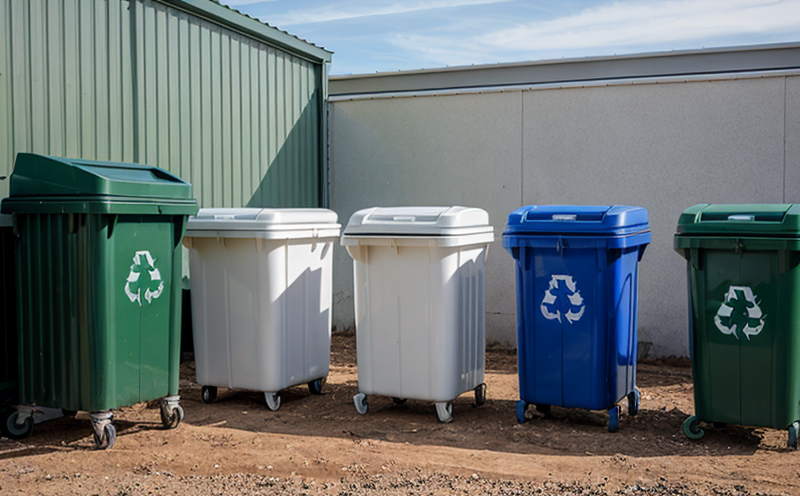EN 13432-19 Industrial Compostability Test
The European Standard EN 13432 defines a comprehensive set of requirements and test methods for biodegradable plastics to ensure they can fully decompose in industrial composting conditions. The standard is crucial for the packaging industry as it ensures that products labeled as 'compostable' meet strict environmental criteria, promoting sustainable practices.
The EN 13432-19 Industrial Compostability Test evaluates whether a material can biodegrade into CO2, water, and biomass under industrial composting conditions. This includes testing for the absence of toxic residues and ensuring that the materials break down within an appropriate timeframe.
The test protocol is divided into several stages:
- Preparation of Specimen: Samples are prepared in accordance with EN 13432, which may include cutting them to standard dimensions for testing.
- Biodegradation Test: The specimens are incubated under industrial composting conditions as specified by the standard. This typically involves simulating a high-temperature composting environment (58°C) over an extended period.
- Residue Analysis: After the test, any remaining residue is analyzed to ensure it does not contain harmful substances. The analysis includes checking for heavy metals and other pollutants.
- Biodegradation Confirmation: The final step involves confirming that at least 90% of the original mass has decomposed into CO2.
The test requires precise control over environmental parameters, including temperature, humidity, and oxygen levels. Compliance with this standard is essential for manufacturers aiming to introduce products labeled as 'compostable' onto the market.
In summary, EN 13432-19 ensures that packaging materials degrade in industrial composting facilities without leaving harmful residues behind. This promotes a circular economy by reducing landfill waste and encouraging the use of sustainable practices.
Why It Matters
The importance of sustainability testing cannot be overstated, especially within the packaging sector. Packaging is one of the largest contributors to global waste, with a significant portion ending up in landfills where it remains for centuries. By implementing standards like EN 13432-19, manufacturers can ensure their products contribute positively to environmental goals.
Compliance with this standard not only helps companies meet regulatory requirements but also enhances their reputation among eco-conscious consumers. This can lead to increased market share and customer loyalty. Moreover, it supports a circular economy by ensuring that packaging materials are recyclable or compostable at the end of their lifecycle.
The test ensures that products labeled as 'compostable' truly meet environmental criteria, thereby fostering consumer trust in green claims. Regulatory bodies around the world are increasingly adopting such standards to promote sustainable practices, making compliance a strategic necessity for businesses.
By investing in sustainability testing, companies can demonstrate their commitment to reducing waste and protecting the environment. This not only aligns with global trends but also positions them as leaders in eco-friendly innovation within the packaging industry.
Industry Applications
| Application Area | Description |
|---|---|
| Packaging Design | Evaluates whether a new packaging design will meet industrial compostability standards. |
| Supply Chain Management | Ensures that all packaging materials used within the supply chain are biodegradable and sustainable. |
| R&D Innovations | Tests experimental packaging materials to ensure they comply with industrial composting requirements. |
| Compliance Reporting | Provides comprehensive reports that can be submitted to regulatory bodies for compliance purposes. |
| Marketing Strategy | Supports marketing efforts by providing evidence of a company's commitment to sustainability. |
| Customer Engagement | Builds trust with customers who are concerned about environmental impact. |
The EN 13432-19 Industrial Compostability Test is particularly relevant for companies involved in the design, production, and distribution of packaging materials. By ensuring that their products meet these stringent standards, businesses can contribute to reducing waste and promoting a more sustainable future.
Competitive Advantage and Market Impact
Compliance with EN 13432-19 offers several strategic advantages for packaging manufacturers. It allows companies to differentiate themselves in the market by offering products that are genuinely sustainable and biodegradable, thus attracting environmentally conscious consumers.
By investing in sustainability testing early on, firms can stay ahead of regulatory changes and consumer trends. This proactive approach ensures they meet evolving standards and remain competitive as environmental concerns continue to grow in importance.
Compliance with this standard also opens up new market opportunities. For instance, companies can target specific sectors like food packaging or agricultural mulch films that require biodegradable materials for sustainability reasons. Additionally, compliance can enhance brand reputation, leading to increased sales and customer loyalty.
The test results can be used in various contexts, including marketing materials, supply chain communications, and regulatory submissions. This comprehensive approach ensures that businesses are well-equipped to meet the demands of a growing number of eco-conscious consumers.





